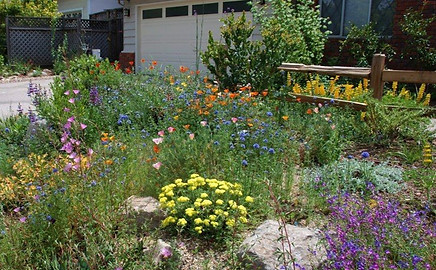
Create Bird Habitat
With the effects of climate change and urbanization over the years in the U.S., our ecosystem has taken a substantial hit. Millions of acres that used to support wildlife have been transformed to accommodate urban sprawl, resulting in human-dominated landscapes that no longer sustain the needs of a functioning ecosystem. The natural areas left are strained and struggling to support the vast amounts of wildlife that rely on them for survival. By choosing to plant native plants in our communities, we can make a meaningful impact on the wildlife in Monterey County.
Striving to make yard, patio, or neighborhood park as bird-friendly as possible includes reducing the potential dangers that might be there. If you're going to make wonderful habitat to bring the birds in close, you'll want to make sure they are able to live there safely. In this regard, ensuring that cats are kept indoors and cannot harm the local wildlife, retrofitting windows to be bird-strike-proof, and making sure that any bird feeders or bid baths are kept clean and sanitary (National Audubon 2014).
Native plants feed birds! Many birds are insectivorous - they don't even eat seeds. Native plants host far more insect species than exotic species. If you plant native plants, you'll be helping out beneficial insects, sequestering carbon, saving money, and attracting more birds to your yard or patio.


Plants to avoid!
Least helpful plant species in Monterey region:
- Scotch broom
- Iceplant
- Acacia species
- European beachgrass
- Giant reed
- Pampas grass
- Sweet alyssum
- Fountaingrass
- Callalily
- Greater periwinkle/Vinca vine
Know Your Rights: You can plant drought resistant and native plants
AB 2104 was signed into law to clarify that homeowners in common interest developments (like HOAs) can plant “climate appropriate landscaping” without fear of being fined. Civil Code section 4735 protects the rights of California homeowners to install drought-resistant landscaping, including native plants.

Need to learn the plants in your neighborhood? Try Seek!

Want to help create bird habitat "in the wild"? Join a California State Parks volunteer day!
Some of us don't have large parcels of land to improve for wildlife habitat. But our shared public lands are a great place to put in some work for wildlife!


